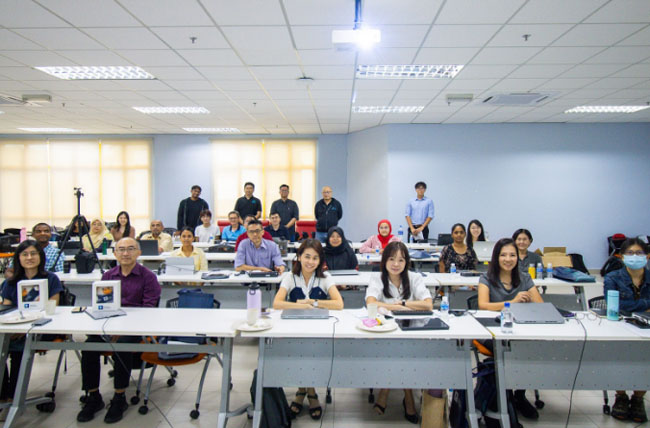On 25th September 2024, the University of Nottingham Malaysia (UNM) hosted a workshop on the topic of, “Biosensing with DNA Nanotechnology: From Design to Application,” in collaboration with the Royal Society of Chemistry (RSC).
Mutually funded by the University of Nottingham Malaysia’s Faculty of Science and Engineering (FOSE) and the Royal Society of Chemistry (RSC) Researcher Collaboration Fund, this workshop focused on recent advancements in DNA nanotechnology for biosensing applications. The sessions covered a range of topics, including DNA circuit design, the development and application of aptamers, as well as hands-on demonstrations with the APTCAD software. The workshop was attended by 22 participants from various institutions and was led by prominent experts in the field, fostering an exchange of ideas and collaborative discussions. This event aimed to bridge research and practical application in addressing real-world challenges in biosensing.

The workshop was organised by Associate Professor Dr New Siu Yee, Associate Professor Dr Michelle Tan, and Professor Dr Sandy Loh from the School of Pharmacy. Distinguished speakers included Dr Lanry Yung and Dr Ang Yan Shan from the National University of Singapore, who provided comprehensive insights into designing DNA circuits using the NUPACK structural simulation tool. Additionally, Mr Rishi Ruben from Biogenes Technology, accompanied by Biogenes training team members Dr Tan Yee Joon, Mr Cheng Kim Sing, and Mr Tang Kok Mun, delivered an in-depth session on the potential applications of aptamers. They further demonstrated in silico aptamer design through the APTCAD software, highlighting its capabilities in advancing innovative biological solutions.
This event holds significant importance for the faculty, aligning with its core objectives of advancing research capabilities and fostering innovation in biosensing technology through the integration of advanced techniques consistent with Industry 4.0 advancements. Furthermore, it underscores UNM's dedication to the United Nations Sustainable Development Goals (SDGs), particularly in promoting good health and well-being (SDG3), fostering innovation (SDG9), and encouraging responsible consumption (SDG12). This commitment enhances the faculty’s reputation as a centre for interdisciplinary research and development with a focus on societal and global impact. Participants were afforded a valuable opportunity to develop expertise in DNA circuit design through practical engagement with the NUPACK and APTCAD software tools for biosensor applications. They were also encouraged to build networks, explore potential research collaborations, and generate multidisciplinary ideas that bridge academic theory with industrial application in the field of DNA biosensing, further reinforcing the faculty’s dedication to impactful research and innovation.
Posted on 5th November 2024